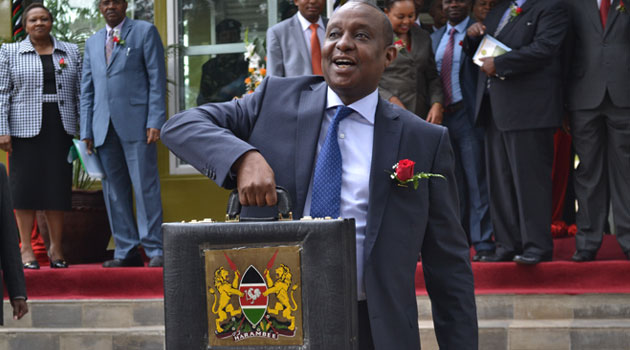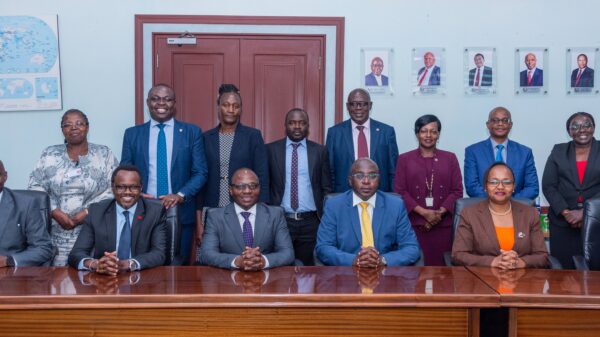
Kenya he said has also made remarkable progress in improving access of the population to financial services, including through mobile banking/FILE
NAIROBI, Kenya, May 10 – International Monitory Fund (IMF) has urged Kenya to bring down the budget deficit in order for debt to remain in manageable levels.
IMF First Deputy Managing Director David Lipton says although Kenya’s public debt is at a moderate level and remains in safe zone, the country needs to undertake a growth-friendly reduction in fiscal deficits over the medium term to maintain debt sustainability.
“The Kenyan government has an objective of lowering the budget deficit by three percentage points during the two years of IMF supporting program. We think that’s a wise course of action,” he said.
Kenya secured a new loan from the IMF totalling Sh153 billion ($1.5 billion) earlier this year to be utilised in the next 24 months in case of external shocks.
However, the country does not have to draw the precautionary forex cash unless a real shock translates into a balance of payments problem.
Only a major turbulence of the shilling would prompt Kenya to draw.
Lipton was however impressed by the country’s achievements in recent years despite strong global headwinds.
“Real GDP growth averaged 5.5 percent per year and inflation broadly remained within target during 2013–15,” Lipton stated.
At the same time he said there was a need for Kenya to continue in priority spending of the government including infrastructure, health and education as they will sustain the rapid growth in Kenya.
“Compromises will have to be made; in order to bring the deficit down that include prioritizing spending, balance can be done successfully. We support the government’s effort to strengthen revenue mobilization, review its expenditure priorities, and increase the quality of expenditures,” he cautioned.
He was particularly impressed by the significant improvements in public infrastructure, in particular in electricity generation and the road network.
Kenya he said has also made remarkable progress in improving access of the population to financial services, including through mobile banking.
“Kenya has become an important destination of capital inflows from advanced and emerging markets. Many structural reforms have advanced, including in the areas of devolution, public financial management, and business regulations,” he stated.
He also commented on the recent challenges in the financial sector that saw about three banks go into receivership and urged for an urgent strengthening of supervision and regulation of the banking system, as well as to bolster the financial system’s safety nets.
“My visit confirmed my view that Kenya has set the basis to make steadfast progress in advancing national development. The IMF will support Kenya in this journey through policy advice and capacity building. Should adverse external developments jeopardize the country’s development path, Kenya can rely on IMF financial support in the context of insurance-like precautionary facilities available for the country over the next two years,” he added.
The National Treasury last month submitted Sh2.3 trillion national budget estimates for the financial year 2016/2017.
The Treasury is targeting a revenue collection of Sh1.49 billion up from Sh1.29 billion in the last financial year.
Overall expenditure and net lending is projected at Sh2.26 billion up from the estimated Sh1.84 billion in the current financial year.
Domestic financing of development plans is estimated at Sh398.4 billion up from Sh305 billion while the country has received commitments worth Sh410.6 billion in external financing.
In the executive summary, the Treasury Cabinet Secretary Henry Rotich said external borrowing will largely be biased towards concessional loans.
The budget which has been prepared during a slow global recovery will focus on economic growth and sustainable development.
Earlier, IMF lowered Kenya’s Gross Domestic Product growth projections to 6 percent in 2016 from 6.8 percent.
This was the second revision having lowered projections from 7.2 percent to 6.8 percent in November 2015.
The downwards revision of medium term potential was as a result of tighter external and domestic financing conditions that will reduce private and public investments relative to earlier forecasts.
Growth is expected to pick up further after 2016, supported by continued improvements in the business environment, modernized and expanded transport and energy infrastructure, and regional integration.
The IMF concurred that risks to the growth outlook were on the downside for Kenya, but noted a potential increase in volatility of capital flows as representing the strongest downside risk.


































